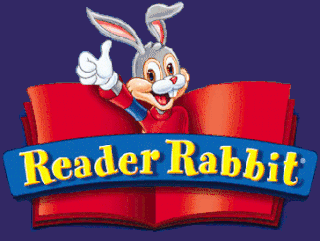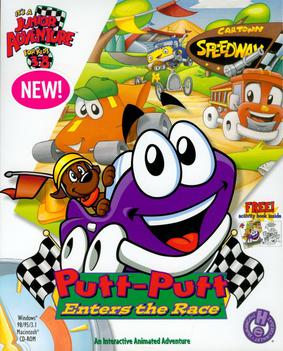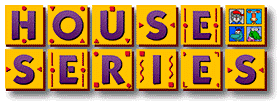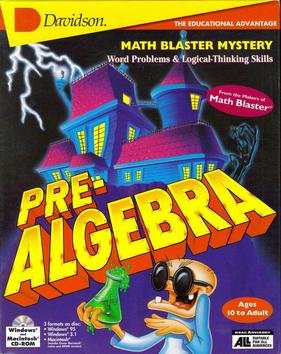The Learning Company (TLC) was an educational software company founded in 1980 in Palo Alto, California and headquartered in Fremont, California. The company produced a grade-based line of learning software, edutainment games, and productivity tools. Its titles included the flagship series Reader Rabbit, for preschoolers through second graders, and The ClueFinders, for more advanced students. The company was also known for publishing licensed educational titles featuring characters such as Arthur, Scooby-Doo, Zoboomafoo, and Caillou.
A math circle is an extracurricular activity intended to enrich students' understanding of mathematics.

Reader Rabbit is an educational game franchise created in 1984 by The Learning Company. The series is aimed at children from infancy to the age of nine. In 1998, a spiritual successor series called The ClueFinders was released for older students aged seven to twelve.

Microsoft Math Solver is an entry-level educational app that solves math and science problems. Developed and maintained by Microsoft, it is primarily targeted at students as a learning tool. Until 2015, it ran on Microsoft Windows. Since then, it has been developed for the web platform and mobile devices.

Conrad Wolfram is a British technologist and businessman known for his work in information technology and mathematics education reform. In June 2020, Wolfram released his first book, The Math(s) Fix: An Education Blueprint for the AI Age.

Putt-Putt Enters the Race is an educational adventure game developed and published by Humongous Entertainment on January 1, 1999. The game is the fifth entry in the Putt-Putt series. This is the first of three games to feature Nancy Cartwright as the voice of Putt-Putt.
The Magic School Bus is a series of educational software video games developed by Music Pen and published by Microsoft via their Microsoft Home brand. The interactive adventures are part of the larger franchise and based with The Magic School Bus original series books and public television series.

The American Girls Premiere is an educational computer game developed and published by The Learning Company for American Girl. The game allows players to create theatrical productions featuring characters from American Girl's Historical collection, along with scenes and other elements unique to each of the girls' respective time periods.

Where in the World of Music Is Carmen Sandiego? is a concert series developed by Gary Sheldon. It consists of three concerts: The Case of the Missing Concert Hall, The Case of the Missing Bells, and The Case of the Missing Pyramids. The annual family concerts are based on the popular Carmen Sandiego video game Where In The World, and the subsequent franchise. Sheldon has "taken [the show] to orchestras throughout America". Bobby Weinapple, who starred as Inspector Clue-Not in the shows, still works with singers of all kinds at Seydways Studios in San Francisco.

Early Learning House or simply the House Series is a collection of four main educational video games and two compilations for the Windows and Macintosh platforms, developed by Theatrix Interactive, Inc. and published by Edmark software. Each different game focuses on a particular major learning category with selectable skill settings for preschooler, kindergarten and elementary learners. Millie's Math House (1992) on mathematics, Bailey's Book House (1993) on language, Sammy's Science House (1994) on science, and Trudy's Time and Place House (1995) on history and geography. A spin-off, Stanley's Sticker Stories (1996), sees players create animated storybooks with the series' characters. Millie & Bailey Preschool and Millie & Bailey Kindergarten each contain the combined activities from two of the four software products. In addition the programs can be configured by an adult mode to suit students with special needs. Most of the activities in every game have two modes, one to allow learners to explore and try it out for themselves and the other for learners to follow specific tasks set by the game characters. Learners also have the option to print pictures of creative activities and record sounds in phonics activities. Later the games were re-developed by Houghton Mifflin Harcourt Learning Technology and re-published by The Learning Company with newer graphics and additional activities.
Madeline is a series of educational point-and-click adventure video games which were developed during the mid-1990s for Windows and Mac systems. The games are an extension of the Madeline series of children's books by Ludwig Bemelmans, which describe the adventures of a young French girl. The video-game series was produced concurrently with a TV series of the same name, with characters and voice actors from the show.
The Arthur video games franchise was a series of learning and interactive story video games based on the American-Canadian children's TV show Arthur. The games were released in the 1990s and 2000s for PlayStation and Windows and Mac OS computers.
Several video games based upon Blue's Clues, a children's educational television series by Nickelodeon, have been released, educational video games and web browser games based on the show. Most of the PC CD ROM-format titles were developed and published by Humongous Entertainment.

Math Rabbit is a 1986 video game spin-off from the Reader Rabbit edutainment series. It was made by The Learning Company for MS-DOS and Apple II series. A Deluxe version was released in 1993 for MS-DOS, Macintosh, and Windows 3.x. In 1997, the game was remade for Windows and Macintosh as Reader Rabbit's Math 1. The final remake for Windows and Macintosh in 1998 is Reader Rabbit's Math Ages 4-6, with a personalized version released in 1999.

Math Blaster Mystery: The Great Brain Robbery is a product in a line of educational products created by Davidson & Associates that takes place in a different universe from the original Math Blaster. It has no relation to Davidson's earlier Apple II game Math Blaster Mystery. The game was released in North America, Sweden and Spain. The game was remade in 1998 with the title Math Blaster: Pre-Algebra. The game is regarded as a 'Review and Practice' type of software.

Math Blaster! is a 1983 education video game, and the first entry in the "Math Blaster" series within the Blaster Learning System created by Davidson & Associates. The game was developed by former educator Jan Davidson. It would be revised and ported to newer hardware and operating systems, with enhanced versions rebranded as Math Blaster Plus! (1987), followed by New Math Blaster Plus! (1990). A full redesign was done in 1993 as Math Blaster Episode I: In Search of Spot and again in 1996 as Mega Math Blaster.

Headline Harry and the Great Paper Race is an educational video game by Davidson & Associates based on newsroom journalism. The game has a "find-the-clue" format in the vein of titles like Where in the World is Carmen Sandiego.

Math Blaster for 1st Grade is a 1999 educational video game in a line of educational products originally created by Davidson & Associates and continued by Knowledge Adventure. The game was re-released in 2000 as Math Blaster Mission 2.

Math Blaster Mystery is a 1989 educational video game within the Blaster Learning System franchise, developed by Davidson & Associates. It was the second title after the original Math Blaster! and available on Apple II, Apple IIGS and Macintosh computers.













